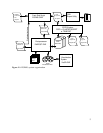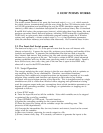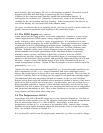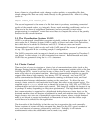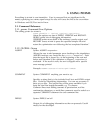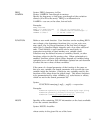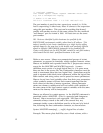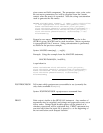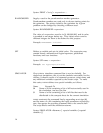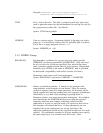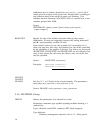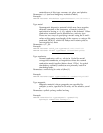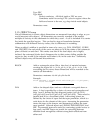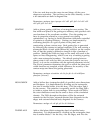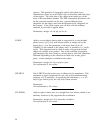
given name and field component. The parameters xsize, ysize, zsize
are not macro parameters, but will be supplied from the current
context when the macro is expanded. Note the string concatenation
used to generate the file names.
MACDEF FieldAll(kwd, fname)), /* Make I and Q field files
/* with appropriate file names and symbolic limits
FIELD variable=kwd xlo=0 xhi=xmax ylo=0 yhi=ymax ,
zlo=0 zhi=zsize phase=0.0 state=steady file=fname’i’; ,
FIELD variable=kwd xlo=0 xhi=xsize ylo=0 yhi=ysize ,
zlo=0 zhi=zsize phase=2*atan(1) state=steady /* etc
file=fname’q’;
MACRO Expand a user macro. Unlike MACDEF, which must be in the
GLOBAL group, MACRO can be used anywhere. Macro expansion
is typographical, like C macros. String concatenation is performed,
as shown in the previous example.
Syntax: MACRO name(arg1, ..., argN);
Example: Using the example from the MACDEF statement,
MACRO FieldAll(Ex, Ant01Ex);
is equivalent to
FIELD variable=Ex xlo=0 xhi=xsize ylo=0 yhi=ysize ,
zlo=0 zhi=zsize phase=0.0 state=steady file=Ant01Exi;,
FIELD variable=Ex xlo=0 xhi=xsize ylo=0 yhi=ysize ,
zlo=0 zhi=zsize phase=2*atan(1) state=steady ,
file=Ant01Exq;
POSTPROCESSOR Tell POEMS which postprocessor executable to use (currently the
only choice available is empost).
Syntax: POSTPROCESSOR <postprocessor command line>
PRINT Print output, similar to the REXX SAY statement. Any number of
arguments may be supplied, and strings and expressions may occur
in any order. Strings inside double quotes will be printed as is,
whereas expressions will be evaluated first. PRINT statements are
executed each time the input file is parsed, i.e. at the beginning of
the run and before each tempest iteration.
13



